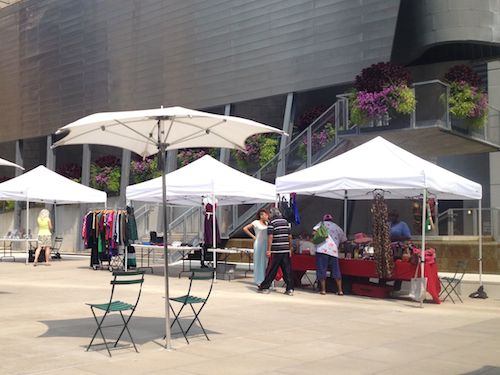Pop-Up Retail Different Than Food Trucks?
Downtown and city leadership have long opposed food carts/trucks, citing the need to support brick & mortar restaurants over temporary operations with little overhead. Retail, however, is viewed differently. “Pop-up retail” gets the blessing of the Partnership for Downtown St. Louis.

Don’t get me wrong, I like pop-up retail and pop-up/drive-up restaurants. They seem the same to me, a business in a temporary location for a brief period. I’m in the camp that thinks more street vending would make downtown more vibrant, attracting more people. More people means more customers for brick & mortar retail & restaurants.
Conversely, dead sidewalks are a disincentive to walk and window shop. A decade ago leaders wanted to make the Old Post Office District a 24/7 area, but they haven’t done much of anything to get there. Culinaria initially stayed open until 10pm but now closes at 9pm.
Can anyone tell me why pop-up retail is OK but pop-up restaurants aren’t?
You can only buy one lunch every day, but when people shop for retail items, there’s no expectation that you’ll buy before you walk out/away. If an art gallery could sell something for $10 to everyone that walked in, it would be one business model; if they can only sell artwork to one out of every 50 or 100 lookie-loo’s, it’s a different business model, and explains why their art goes for $500 or $1,000. The food court at the shopping mall (or the snack bar in the big box store) doesn’t serve as a destination for most shoppers, it’s the stores selling “stuff” – most people just eat at the food court because it’s there.
Well, I completely agree that both forms of commerce are great for the customers, the vendors, and the vitality of the area where they sit. But if I had to guess, the difference would be reach and vulnerability to regulation.
Food trucks go wherever there’s a street and a sidewalk of some sort. So absent protectionist rules, trucks can pop up anywhere there might be hungry people near a street. They can also plausibly operate every day there are customers. So they have extensive reach. Pop up retailers are limited to open spaces, usually off the sidewalk (except for Carlos’ hot dog stand), and exist at the whim of the property owner. As a practical matter, most pop up retailers, art fairs, and craft exhibitions tend to happen rarely, anywhere from a few days every year to a half-day every week or two (depending on the city and the open space). So they aren’t as present as food trucks could be.
It’s also about the ability to control and regulate the vendors. Sitting for hours in a public space, vendors are vulnerable to inspection, shut down, or perusal. They are also subject to the whims of the plaza owner, often a public entity or a pro-city hall private entity. Food trucks can move much faster from their spaces and evade inspection (a common complaint of health inspectors is notice of locations months in advance, to facilitate surprise inspections, even though the business model tends toward extreme flexibility). Even though I doubt that happens often, inspectors and officials are nervous of the dynamic.
Food trucks are also perceived as a new and growing trend, whereas pop-up retail is not seen as a fad or trend that might displace stationary retailers. When in doubt, regulators distrust anything that involves change or newness, and think that everything should be cataloged and reported to them. To the extent an enterprise seems likely to evade their grasp, or to significantly alter accepted practices, you can usually rely on governments to dislike them.
I think there is room for both, as long as both obey the rules set for them: stay off the sidewalk, limit time parked, remove your trash, etc. It should be noted that food trucks have to be inspected for the safety of it’s customers, retail does not. Just because you like a taco or cupcake, doesn’t mean that it’s safe to eat.
How about a middle ground? It’s getting cold. Could the Partnership for Downtown convince landlords to give vacant space to vendors for, say, November and December 2014? They could promote holiday shopping downtown.
Maybe the Partnership could also convince landlords to give their existing tenants free rent for a couple of months, as well?! Yeah, right! That’s why brick-and-mortar operators object to mobile merchants using the public right-of-way for free – it ain’t a level playing field! If the city charged rent (a concession fee), it might be a different story, but until everyone gets free rent, no one should get an unfair advantage!
Not to mention that food or retail…..want to make a bet they are not charging the correct tax (if at all), especially when they park in a TIF zone. Giving unfair advantage over brick.